You are here
New Releases
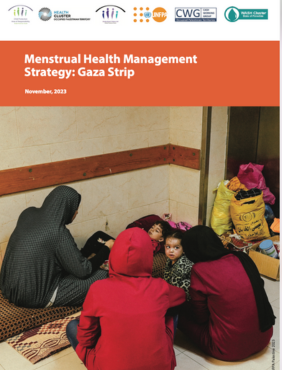
Menstrual Health Management Strategy: Gaza Strip
Why is menstrual health management (MHM) in humanitarian emergencies important?
The lack of supplies (or ability to purchase from remaining market supplies), lack of clean water, lack of functioning toilets and washrooms, lack of clothing and lack of a waste disposal system have made the management of menstrual health, in a dignied and safe way, impossible. It is essential that the humanitarian response takes a coordinated approach to meeting the needs of women and girls ensuring that adequate MHM supplies such as disposable pads and underwear are part of the prioritization and distribution plans as well as ensuring MHM is linked where possible to programmatic interventions such as those targeting adolescent girls, protection risk mitigation, and community leadership in the shelter sites. This strategy, developed by UNFPA and the GBV Sub-Cluster, aims to bring together those that have a role in MHM including WASH, CVA, Health, Shelter, Child Protection and GBV.
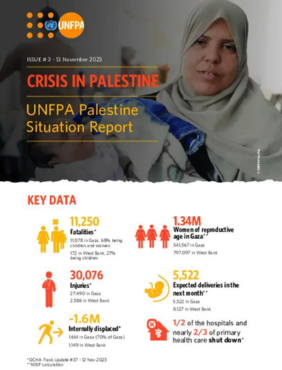
UNFPA Palestine Situation Report #3 - 14 November 2023
The humanitarian situation in Gaza has reached a catastrophic point. Out of the 11,078 reported fatalities as of November 12, an estimated 68% are women and children. Nearly 1.6 million people are now internally displaced.
Urgent action is needed to ensure access for 5,500 pregnant women expected to deliver in the next 30 days in Gaza. Pregnant and lactating women, with higher daily water and caloric intake requirements, face health risks due to the lack of food and water across Gaza. The well-being of over 690,000 menstruating women and girls is also at risk due to limited access to menstrual hygiene products, compounded by inadequate water, hygiene, and privacy.
Moreover, approximately half a million adolescent boys and girls in Gaza have experienced disrupted education and trauma.
UNFPA is urgently appealing for US$14.1 million to implement a three-month response plan aligned with the revised Flash Appeal (October-December).
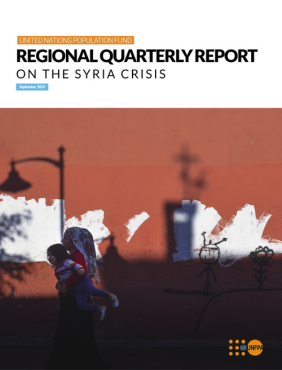
Regional Quarterly Report on the Syria Crisis
As of September 2023, the needs of Syrians and host communities are higher than ever, particularly in light of widespread economic collapse, the cumulative impact of 12 years of conflict, climate-related challenges, natural disasters, and various other socio- political factors. Despite the continuing efforts of humanitarian actors, the Syria crisis remains one of the world’s most complex humanitarian and protection emergencies. In 2023, 15.3 million people are in need of humanitarian assistance — the highest number since the onset of the crisis in 2011. This includes 7.7 million women and girls, 4.2 million of whom are of reproductive age. Meanwhile, more than 6.8 million Syrian refugees remain as refugees in five neighbouring countries – Türkiye, Lebanon, Jordan, Iraq and Egypt, nearly half of whom are women and girls. This report offers a bird’s eye view of UNFPA’s operations within the context of the Syria crisis. The report is prepared by the UNFPA Regional Humanitarian Hub for Syria and the Arab States (The Hub) in Amman, and spans operations led by UNFPA offices in Türkiye, Lebanon, Jordan, Iraq, and Egypt, in addition to operations led inside Syria, both from Damascus and cross-border via Türkiye. The quantitative data presented in this report is cumulative, covering achievements made between January and September
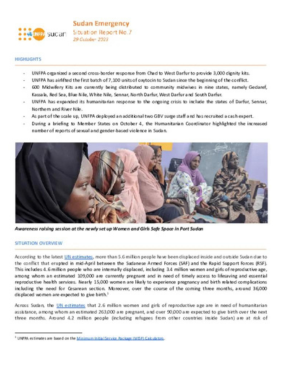
UNFPA Sudan Emergency Situation Report #7 - 29 October 2023
As the conflict enters its seventh month, ensuring protection and reproductive health remains a top priority. UNFPA has increased its response capacity by collaborating with new operational partners. While facing challenges related to security, humanitarian access, and administrative constraints, UNFPA is able to operate through implementing partners in hard-to-reach areas. About 600 Midwifery Kits are being distributed to community midwives in nine states. Moreover, UNFPA initiated a second cross-border response, delivering 3,000 dignity kits from Chad to West Darfur. During a briefing to Member States on October 4, the Humanitarian Coordinator highlighted a notable increase in reports of sexual and gender-based violence in Sudan.
According to the latest UN estimates, more than 5.6 million people have been displaced inside and outside Sudan due to the conflict that erupted in mid-April between the Sudanese Armed Forces (SAF) and the Rapid Support Forces (RSF). This includes 4.6 million people who are internally displaced, including 3.4 million women and girls of reproductive age, among whom an estimated 109,000 are currently pregnant and in need of timely access to lifesaving and essential reproductive health services. Nearly 15,000 women are likely to experience pregnancy and birth related complications including the need for Cesarean section. Moreover, over the course of the coming three months, around 36,000 displaced women are expected to give birth.
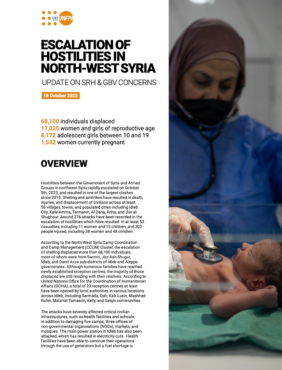
Escalation of hostilities in North-West Syria - Update on SRH & GBV concerns
Hostilities between the Government of Syria and Armed Groups in northwest Syria rapidly escalated on October 5th, 2023, and resulted in one of the largest clashes since 2019. Shelling and airstrikes have resulted in death, injuries, and displacement of civilians across at least
50 villages, towns, and populated cities including Idleb City, Kafe Amma, Termanin, Al Dana, Ariha, and Jisr al- Shughour. Around 276 attacks have been recorded in the escalation of hostilities which have resulted in at least 53 casualties, including 11 women and 15 children, and 303 people injured, including 38 women and 48 children.
According to the North-West Syria Camp Coordination and Camp Management (CCCM) Cluster, the escalation of shelling displaced more than 68,100 individuals, most of whom were from Sarmin, Jisr-Ash-Shugur, Idleb, and Daret Azza sub-districts of Idleb and Aleppo governorates. Although numerous families have reached newly established reception centres, the majority of those displaced are still residing with their relatives. According to United Nations Office for the Coordination of Humanitarian Affairs (OCHA), a total of 23 reception centres at least have been opened by local authorities in various locations across Idleb, including Sarmada, Qah, Kafr Lusin, Mashhad Ruhin, Ma’arrat Tamasrin, Kelly, and Salqin communities.
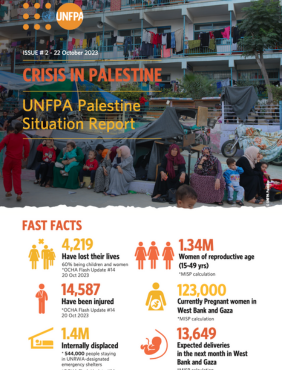
UNFPA Palestine Situation Report -ISSUE #2 - October 2023
The humanitarian situation in Gaza remains extremely dire with potential consequences that will impact the region and exacerbate an already-fragile situation.
On 21 October, a convoy of 20 aid trucks entered Gaza through the Rafah crossing, the first aid supplies reaching Gaza from the outside since the hostilities began on October 7. The United Nations calls for 100 trucks of aid supplies daily to meet the humanitarian needs of Gaza’s 2.2 million residents including one million newly displaced inside Gaza. However, fuel has not been allowed to enter Gaza yet. With Gaza under a complete siege and no water and electricity, fuel becomes life-saving as it is needed for generators to desalinate water and power hospitals. The Ministry of Health has warned that the delay in delivering fuel to hospitals puts the lives of thousands of patients and wounded at risk.
Among the 2,2 million affected population in Gaza, 1 in 4 are women and girls of reproductive age, around 572,000, and they need urgent access to reproductive health supplies and services.
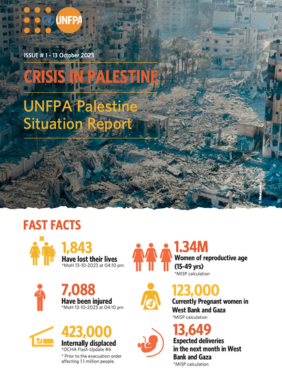
UNFPA Palestine Situation Report - October 2023
Following Palestinian armed groups’ launch of “Operation Al-Asqa Flood” on 7 October, the Israeli Forces launched operation “Iron Sword“ with strikes on the Gaza Strip by air, land and sea. The current escalation follows six major military escalations between Israel and Palestinian militants in the past years, leading to substantial destruction of Gaza’s infrastructure and grave human suffering. This escalation has been marked by increased brutality and destruction, surpassing previous conflicts. According to the Palestinian Ministry of Health’s update on 13 October, at least 1,799 Palestinians have lost their lives, and 6,388 have been injured in Gaza since the start of the escalation. An additional 44 Palestinians, including four children, were killed, and 700 were injured by Israeli forces in the West Bank. With Israel’s formal declaration of war, the number of vulnerable individuals is expected to increase, and settler attacks in the West Bank and East Jerusalem are becoming more violent.
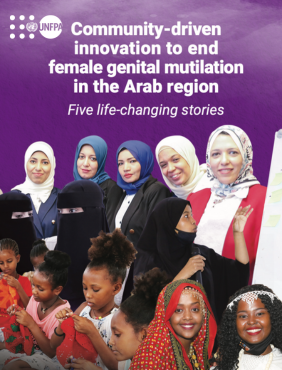
Community-driven innovation to end female genital mutilation in the Arab region - Five life-changing stories
Female genital mutilation (FGM) is an extreme form of violence against women and girls. It is a severe human rights violation with life-long consequences for hundreds of millions of women and girls who are cut across the world.
Since 2008, UNFPA and UNICEF lead the largest global programme to accelerate the elimination of FGM. The UNFPA-UNICEF Joint Programme on the Elimination of Female Genital Mutilation is active in 17 of the worst affected countries globally, including Djibouti, Egypt, Somalia, Sudan and Yemen.
Across the five countries in the Arab region, UNFPA delivers creative solutions to end FGM in partnership with women and girls, men and boys, local leaders and communities.
The five life-changing stories provide a glimpse into how UNFPA and partners everyday accelerate innovation and invest in women’s leadership, networks, technology and social entrepreneurship to eliminate the scourge of FGM.
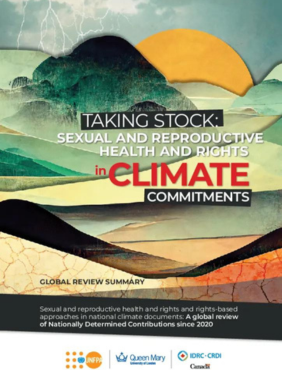
Taking Stock: Sexual and Reproductive and Health and Rights in Climate Commitments: A Global Review
The Nationally Determined Contributions (NDCs) are the most central and globally representative climate policy documents that outline the national climate plans of countries that have ratified the Paris Climate Agreement. Submitted every five years, the NDCs indicate the voluntary commitments of countries to achieving agreed-upon mitigation and adaptation goals.
With climate impacts increasing in scale and intensity, communities on the frontlines are becoming more vulnerable, especially women and girls. As the year 2023 marks the conclusion of the first global stocktake of the Paris Agreement, this report reflects on how 119 NDCs incorporated SRHR issues, and seeks to inform the next cycle of NDCs to be submitted in 2025.
UNFPA, in collaboration with Queen Mary University of London, conducted a systematic content analysis of SRHR references and related thematic areas in NDC documents for 119 countries. Accompanying this will be regional reports for five regions: Arab States, Asia Pacific, East and Southern Africa, Latin America and the Caribbean and West and Central Africa.
This global report examines the integration of sexual reproductive health and rights and related themes - including health, gender, population dynamics, youth, human rights, vulnerable groups and participation - in the NDCs of countries from 2020. It offers recommendations on how the next submissions can more effectively address these intersections in terms of impact, commitments, budget and other critical actions.
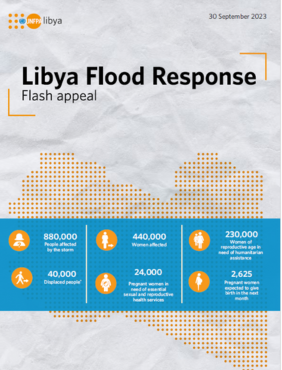
UNFPA Libya Flood Response Flash Appeal - September 2023
This flash appeal is consolidated by UNFPA Libya country office to address the immediate humanitarian response needs of 440,160 women and girls, including up to 230,000 of reproductive age (15-49 years old) among whom an estimated 24,000 women are pregnant and in need of essential sexual and reproductive health (SRH) services including basic and comprehensive emergency obstetric and neonatal care (B/CEmONC) services.
The appeal covers the period from 14 September 2023 to 30 June 2024 (nine months).